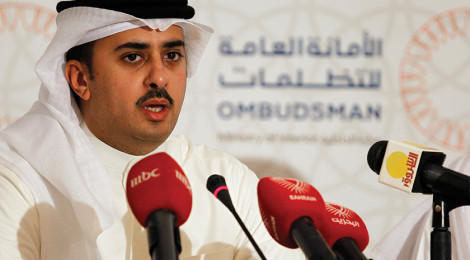Once again, the Bahrain Office of the Ombudsman has released its Second Annual Report on the progress of their complaint program and the state of prisoner and detainee treatment. Like the first report, the statistics on the number of complaints, deaths, and investigations are inconsistent with independently documented numbers, and do not accurately portray the still deteriorating conditions in Bahraini detention centers and prisons.
A particularly problematic statement made in the report about conditions in Jau Prison states that “each cell in the new facilities has, in accordance with international standards, bathroom facilities; adequate natural lighting and a television.” Based on evidence from prisoner reports and statements, this type of renovation has not occurred throughout the entirety of the prison – on the contrary, the conditions in the majority of facilities appear to have deteriorated. After the March 10 riots in Jau Prison, security officers forced detainees to sleep outside in tents, packing as many as 300 individuals into a single tent. Security forces then moved approximately 100 persons accused of “inciting” the riot elsewhere, where prisoners report that they were tortured. Neither these specific issues nor the underlying problems causing their occurrence are investigated in the Ombudsman’s report.
The case of Abbas al-Samea appears to be emblematic of the human rights abuses and deteriorating conditions pervasive throughout the Bahraini detention system, as well as the ineffectiveness of Bahrain’s “independent” Ombudsman. On 3 March 2014, masked security officers arrested al-Samea in relation to a bombing that killed three police officers. Although evidence corroborates al-Samea’s alibi that he was teaching at the time of the bombing, the court sentenced him to death along with two others. Prior to his trial, al-Samea endured various acts of mental and physical torture, ranging from sleep deprivation to severe beating and sexual assault. Despite attempts to raise these issues at trial, the court refused to investigate his allegations of torture; his trial proceedings were so clearly biased against him that his lawyers eventually resigned. In his report, the Ombudsman states that resources have been pulled to investigate any “allegation that procedures for permitting legal representation were not followed”…al-Samea’s family made a complaint with the Ombudsman’s Office regarding his ill-treatment and unethical trial, but was never contacted.
Beyond the ineffectiveness of the Ombudsman’s investigations, recent evidence shows that the Ombudsman office may in fact be contributing to the further torture of inmates in Bahrain’s prison system. ADHRB has received reports of victims telling their families that security officers beat them while stating that the abuse was retribution for the victims’ Ombudsman complaints against them. These cases indicate that the Ombudsman is working with the Ministry of Interior (MOI) to perpetuate human rights abuses, rather than remaining an independent body as it claims.
In our report “Subservient & Unaccountable,” published last year following the Ombudsman’s First Annual Report, ADHRB recommended that the Ombudsman establish independence from the Ministry of the Interior (MOI), which would address the issues involved in biased investigations. The report also advocates for more transparency in the Ombudsman’s annual report, insisting it be comprehensive and address the numerous issues of concern in the detention system. The realization of these recommendations has not been achieved. We therefore reiterate our call for transparency and independence of the Office of the Ombudsman, and urge the Office to investigate all allegations of torture and misconduct, and condemn any alleged retaliation against complainants.
Hilary Erbland is an intern with Americans for Democracy & Human Rights in Bahrain (ADHRB)





